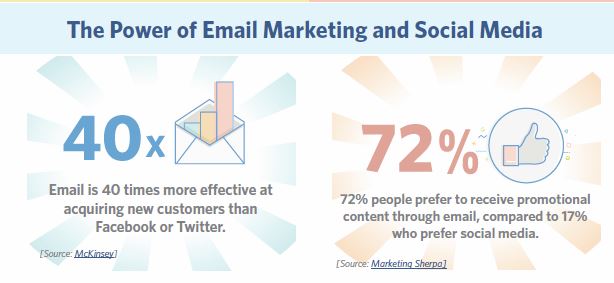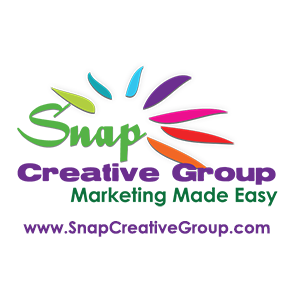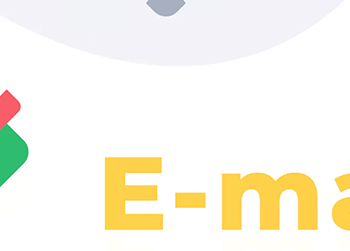
Don’t Fall for These Common Email Marketing Misconceptions
- On June 22, 2018
- 0 Comments
NOTE: The following is borrowed (with permission of course) from Constant Contact®. As a Constant Constant Contact Solution Provider®, I am given the opportunity to share their knowledge base with my readers.
If you’re using email marketing, you already know it’s a valuable tool to stay connected with your customers and generate new opportunities for your business.
But if you’re new to email marketing — or are still on the fence about getting started — you may have heard some things that gave you pause.
You don’t have to look far to see examples of how email marketing can benefit your business, but if you still have some doubts based on things you’ve heard, this post will help set the record straight.
Here are five common email marketing misconceptions:
1. All email is spam
If you’ve had a bad experience with a business or organization sending you unwanted email, you may be reluctant to try email marketing for yourself.
But it’s important to ask — why did you consider that email spam? Maybe you never asked for it in the first place? Or maybe the content you received was different from what you expected when signing up?
While there are certainly people who try deceptive email marketing tactics, it’s important to know that there are rules and laws that are meant to keep spammers away. Legislations like Controlling the Assault of Non-Solicited Pornography and Marketing (CAN-SPAM) and the recently introduced Canadian Anti-Spam Legislation (CASL) are helping to weed out these damaging practices.
Don’t forget that there are millions of reputable businesses and organizations that follow best practices and depend on email to build relationships. At Constant Contact, they have more than 600,000 small businesses, nonprofits, and association customers that use their tools to stay connected with their audience.
Constant Contact has a no tolerance spam policy. They have teams that monitor large import lists and emails going to a large number of subscribers. Any customer found to be using Constant Contact for spam will be cut-off from use of the product immediately.
2. People don’t like reading emails
It’s great to know that not all email is spam, but are people really paying attention to the messages they receive?
Research firm, MarketingSherpa, recently went directly to 2,000 adults in the US and asked them about how they like to hear from their favorite businesses. An overwhelming majority (91 percent) said they do like to receive promotional emails from companies they do business with. 86 percent say they like to receive promotional emails at least monthly and 61 percent at least weekly.
Beyond the data, think about your own experience as a consumer. While there are likely some emails you receive and rarely open, there’s a good chance you have at least a few businesses and organizations that you do appreciate hearing from on a regular basis.
You’re able to stay up-to-date with these businesses and organizations in a way that’s convenient for you. And if you ever decide you want to opt-out, you have the ability to do that — no questions asked.
This brings us to number three…
3. People can’t unsubscribe
You value the relationship you have with your customers and the last thing you’d want is to put them in a position where they’re receiving unwanted messages from your business.
But one of the biggest benefits of using email marketing is that you’re able to give your customers, members, and supporters more control. They have the ability to opt-in to receive your messages, and they also have the ability to opt out at any time.
It’s the policy at Constant Contact that every email contains a mandatory unsubscribe link. This link makes it super simple for contacts to opt-out if they choose to do so. To provide further protection, it’s their policy that those individuals who try to remove this link will be warned that they are doing so. If the link is removed or de-activated in any way, Constant Contact will terminate the customer’s account.
Legislations like CASL also require that your emails include a mechanism (like an unsubscribe link) for people to easily unsubscribe at any time.
Email marketing works best when you’re focused on communicating with people who actually want to hear from you. That’s why it’s so important to always ask permission before adding a new contact to your email list. And it’s why you should always give people the ability to opt-out.
4. You need special expertise or training
When you see the type of emails small businesses and organizations are able to create with an email marketing tool like Constant Contact, you may feel like there are some special skills or training required.
But one of the benefits of using an email marketing provider is that you have access to professionally-designed email templates that you can use to send your message. These templates are designed to make it quick and easy to get your message out to your audience, and ensure you look professional when it lands in the inbox. Constant Contact takes care of the design work for you, so that all you need to do is add your content and customize your message to fit your brand.
And when you do get stuck, they have a team of people who are dedicated to your success. Just pick up the phone and give them a call.
They also partner with marketing experts throughout the country like Snap Creative Group, so if you don’t have time to get your email marketing done on your own, they can connect you with someone to help.

5. Email isn’t as effective as social media
Social media has redefined the way many businesses and organizations reach new audiences and build relationships for their business. But while these platforms are incredibly valuable, it’s important to remember that on sites like Facebook and Twitter, you don’t really have ownership of your network.
Take, for example, Facebook’s News Feed algorithm. At any given moment, only a small percentage of your fans actually see the updates that come from your Facebook Page. After all the work you’ve done to build up your fan base, Facebook gets to decide who sees what. You’re playing on Facebook’s terms.
Email marketing is a cost-effective solution that gives you the power to reach customers in a place most people visit every day — their inbox.



